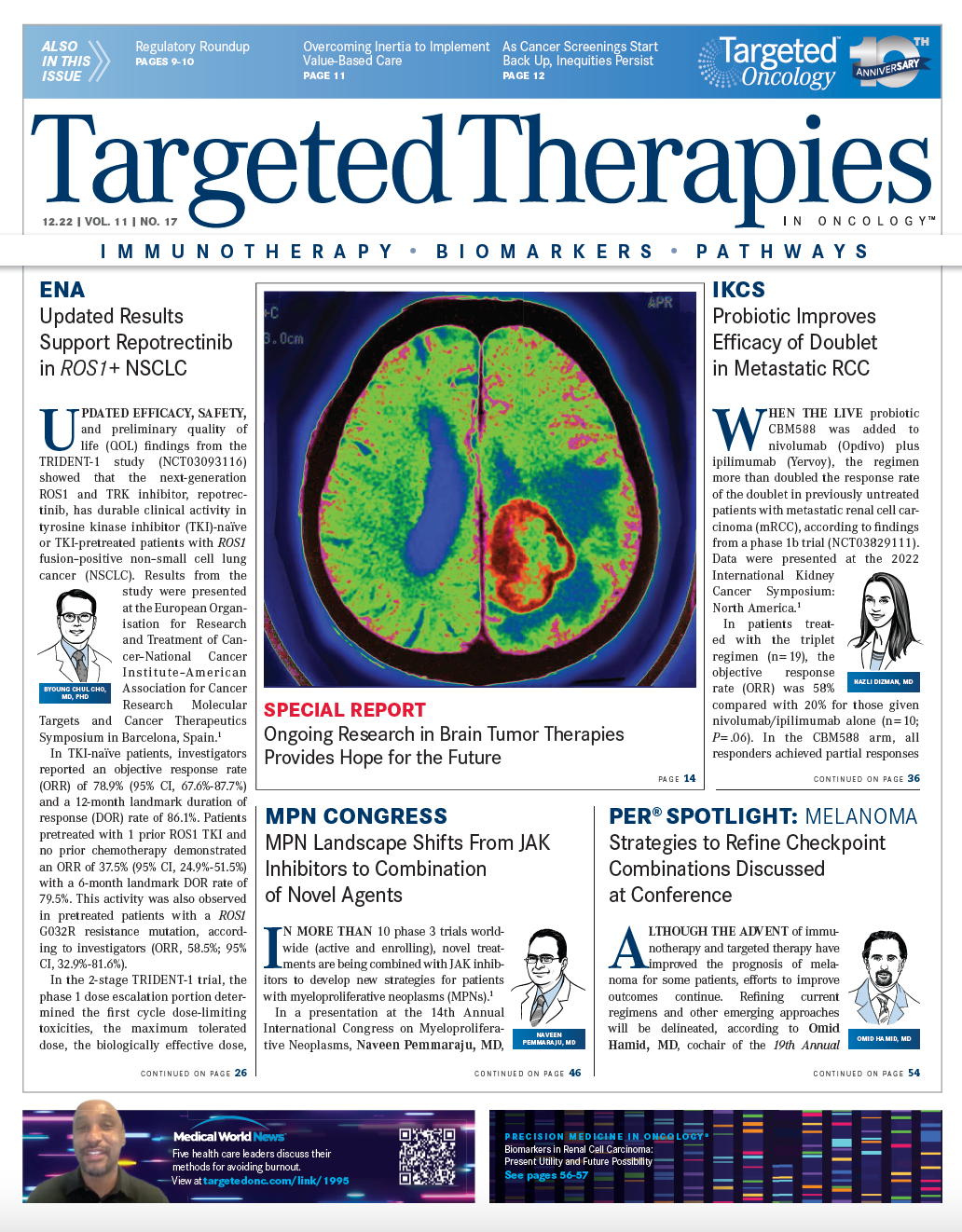Remaining Checkpoint Inhibitor Combinations Remains Key at Melanoma Conference
Refining current regimens and other emerging approaches will be delineated in melanoma, according to Omid Hamid, MD.
Omid Hamid, MD

Although the advent of immunotherapy and targeted therapy have improved the prognosis of melanoma for some patients, efforts to improve outcomes continue. Refining current regimens and other emerging approaches will be delineated, according to Omid Hamid, MD, cochair of the 19th AnnuaInternational Symposium on Melanoma and Other Cutaneous Malignancies®, sponsored by Physicians’ Education Resource (PER®), LLC, is hoping to convey to attendees.
“We’re not done refining immune checkpoint inhibitor combinations and there are novel approaches, including adoptive T-cell therapy, that are undergoing research and may be generalizable to solid tumors,” Hamid, chief, Translational Research and Immunotherapy Program, and director, Melanoma Therapeutics Program at The Angeles Clinic and Research Institute in Los Angeles, California, told Targeted Therapies in Oncology™ during an interview prior to the conference.
In melanoma, immunotherapy approaches and targeted therapies have blazed a trail that may extend to other solid tumors owing to the disease’s significant immunogenicity and response to therapy, Hamid said. “Although we see responses in monotherapy regimens for melanoma, it’s the novel combinations that might have a better response in solid tumors,” he noted. The hybrid conference on February 4, 2023, at the Marriott Dallas Las Colinas in Irving, Texas, will feature presentations on BRAF therapy and bringing adoptive cell therapy into the clinic. Attendees can look forward to separate discussions focusing on neoadjuvant therapy, adjuvant therapy, and surgical management of melanoma.
BRAF-Mutant Melanoma
As director of melanoma research at The Angeles Clinic and Research Institute, Hamid is tasked with designing and running early-phase clinical trials. “We have to adhere to scientific rigor, which means that all the staff must be prepared [and] we have to be willing to have every interaction, each step, and every measurement scrutinized and audited by the FDA,” he said.
The work by Hamid and many other investigators led to the emergence of new therapies; however, there arose a need to understand the proper sequence of treatment for patients with melanoma. In particular, patients whose tumors harbor BRAF-mutant melanoma required more treatment clarity.
In BRAF-mutant melanoma, the treatment sequence of nivolumab (Opdivo) in combination with ipilimumab (Yervoy), followed by a BRAF and MEK inhibitor, was determined to be the optimal sequencing, according to fi ndings of the DREAMseq trial (NCT02224781).1 Prior to the study, there was no clear sequencing path for PD-1 and CTLA-4 therapies combined with BRAF/MEK inhibition because of a lack of data from prospective studies.
The phase 3 DREAMseq trial assessed 265 patients with advanced BRAF-mutant melanoma who were randomly assigned to receive either nivolumab/ipilimumab in arm A or dabrafenib (Tafinlar) plus trametinib (Mekinist) in arm B. In the third and fourth arms (C and D), patients received either dabrafenib/trametinib or nivolumab/ipilimumab, respectively.
In arms A and D, patients were administered nivolumab 1 mg/kg plus ipilimumab 3 mg/kg every 3 weeks in 4 doses, followed by an intravenous (IV) infusion of nivolumab 240 mg every 2 weeks for up to 72 weeks. In arms B and C, patients were administered dabrafenib 150 mg twice per day and trametinib 2 mg orally daily until progressive disease.
Results from step 1 showed that the 2-year overall survival (OS) rate was 71.8% (95% CI, 62.5%-79.1%) in arm A compared with 51.5% (95% CI, 41.7%-60.4%) in arm B, demonstrating a difference of 20.3% (95% CI, 2.6%-37.9%; log-rank P = .010). The median progressionfree survival (PFS) observed in arm A was 11.8 months (range, 5.9-33.5 months) vs 8.5 months (range, 6.5-11.3 months) in arm B (log-rank P = .054).
The overall response rate (ORR) observed during step 1 in arm A was 46.0% (95% CI, 36.6%-55.65%) compared with 43.0% (33.8%- 52.6%) in arm B (Fisher exact test P = .690). The median duration of response (DOR) was not reached (NR; 29.3 months-NR) in arm A vs 12.7 months (8.2 months-NR) in arm B (log-rank P < .001).
The 3-year OS rate observed during step 1 was 66.2% (56.0%-74.6%) in arm A vs 42.8% (32.9%-52.4%) in arm B.
Results were also reported from step 2 of the study. In arm C, the median PFS was 9.9 months (8.3-20.6) compared with 2.9 months (2.6-8.9) in arm D. The ORR observed with arm C was 47.8% (26.8%-69.4%) vs 29.6% (12.7%-47.2%) with arm D.
“To understand the role of sequencing and all the potential confounding factors is what makes the rigor of these trials so important,” Hamid said. “Perhaps the most rewarding nonpatient care issue, though, is the collaboration between a community of like-minded people with a singular focus,” he added.
Adoptive T-Cell Therapy
Looking ahead, Hamid thinks tumor-infiltrating lymphocytes (TILs) will play a key role in melanoma. The success observed with lifileucel in metastatic melanoma has been met with enthusiasm.2
A phase 2 open-label, single-arm study (NCT02360579) evaluated patients with advanced melanoma who had been previously treated with checkpoint inhibitors and BRAF with or without MEK-targeted agents. Sixty- six patients received a lifi leucel infusion of 1 x 109 or greater TIL cells.
Investigators reported that the objective response rate was 36% (95% CI, 25%-49%), with 2 complete responses and 22 partial responses. The median DOR was not reached after a median follow-up of 18.7 months.
Other TIL products are undergoing active evaluation as well: ITIL-168 (DELTA-1; NCT05050006) and ATL001 (NCT03997474).
REFERENCES:
1. Atkins MB, Lee SJ, Chmielowski B, et al. Combination dabrafenib and trametinib versus combination nivolumab and ipilimumab for patients with advanced BRAF-mutant melanoma: the DREAMseq trial-ECOG-ACRIN EA6134. J Clin Oncol. Published online September 27, 2022. doi:10.1200/JCO.22.01763
2. Sarnaik AA, Hamid O, Khushalani NI, et al. Lifi leucel, a tumor-infi trating lymphocyte therapy, in metastatic melanoma. J Clin Oncol. 2021;39(24):2656-2666. doi:10.1200/JCO.21.00612

Survivorship Care Promotes Evidence-Based Approaches for Quality of Life and Beyond
March 21st 2025Frank J. Penedo, PhD, explains the challenges of survivorship care for patients with cancer and how he implements programs to support patients’ emotional, physical, and practical needs.
Read More